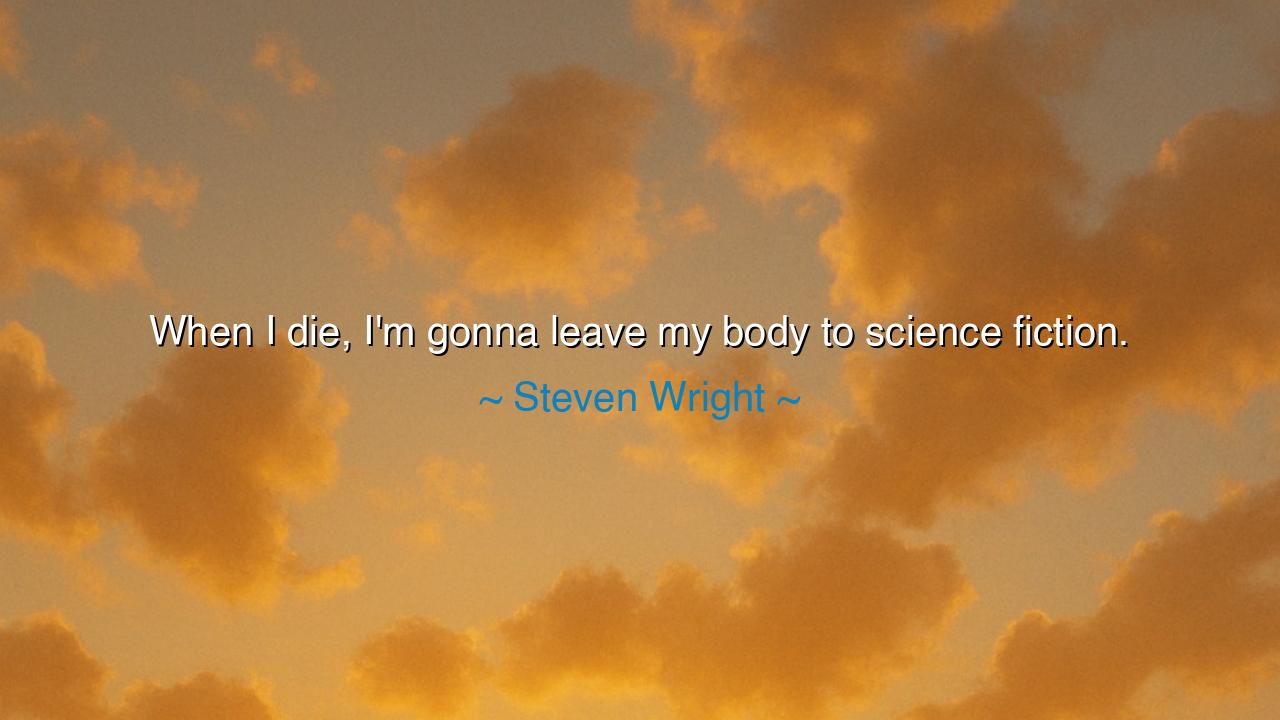
When I die, I'm gonna leave my body to science fiction.






Listen, O children of the earth, for I bring to you the words of Steven Wright, a man whose humor is laced with profound insight. “When I die, I’m gonna leave my body to science fiction.” At first, this may seem a whimsical statement, born of the playful mind of a comedian. Yet beneath this humor lies a truth, a reflection on the transitory nature of life, and the boundless imagination of science fiction. Wright’s words carry with them not just a jest, but a deeper philosophical challenge—a challenge to think beyond the confines of the real world and to embrace the possibilities of what could be, of what might come when human imagination and innovation collide.
In the ancient world, the great minds of philosophy and science were not confined to what the senses could perceive, but sought to imagine worlds and realities beyond the tangible. Plato, in his writings, spoke of the Forms, those idealized concepts that could not be seen or touched but existed in the realm of the mind. The ancient Greeks were no strangers to the concept of imagination, for they looked beyond the known world and dreamed of gods and monsters, of universes shaped by divine hands. They understood that the mind was not limited to the present, but was free to wander, to explore what might be, and to envision worlds both strange and wondrous. Wright, in his humor, follows this ancient tradition, reminding us that the body we inhabit may be finite, but the imagination is boundless.
Science fiction, the genre to which Wright metaphorically leaves his body, has long been a realm where the impossible becomes possible, where the limitations of the present are cast aside in favor of exploring the realms of future possibilities. Just as the ancient Greeks looked to the stars and wondered what lay beyond, so too does science fiction ask the ultimate questions—What if the stars were within our reach? What if humanity could transcend death itself? What if the boundaries of time and space were not as fixed as they seem? In a world where technology rapidly advances, where the impossible becomes reality with every new discovery, science fiction serves as the playground of possibility, a realm where human dreams and fears alike are given life.
Consider the works of Jules Verne, whose novels such as 20,000 Leagues Under the Sea and Journey to the Center of the Earth foresaw technologies and adventures that would shape the future. Verne was a man who looked at the world around him and, instead of accepting it as it was, imagined what could be. His stories of exploration and discovery were not mere fantasies; they were visions of a future where the human spirit could conquer even the vastest seas and the deepest mysteries of the earth. In this, science fiction serves not only as entertainment but as a visionary tool, a way of seeing the world not just as it is, but as it could become. Wright, in his playful way, alludes to this grand tradition by suggesting that his body—his very existence—will be passed on to the realm of possibility, to the imagination that creates worlds and shapes the future.
In science fiction, death itself is not an end but a transformation, an entry into a new realm of existence. Consider the story of Doctor Frankenstein, who sought to conquer death and give life to the inanimate. His creation, the monster, was not merely a creature of flesh, but a symbol of the human desire to overcome the boundaries of life and death. Similarly, Wright’s words evoke the notion that the body, once an instrument of life, can transcend its mortal limits and become part of something greater. It is no longer bound by the constraints of time and decay but becomes a piece of eternal possibility, something that can continue to inspire, challenge, and provoke long after the body has ceased to function.
Thus, the lesson of Wright’s words is not one of finality, but of transformation. Just as the great minds of the past understood that knowledge is not limited to what we see with our eyes, so too must we understand that life is not limited to the physical world we inhabit. The body may return to the earth, but the ideas, dreams, and visions that shape us live on in the imagination, in the endless realms of what could be. Science fiction is not just a genre of fantastical tales; it is the embodiment of the human spirit that reaches beyond the here and now, that asks, What if? and dares to dream of the impossible.
In your own lives, O children, embrace the spirit of science fiction. Know that the possibilities are not limited to the known, to what can be touched or measured. Imagination is as real as any physical object, and it holds within it the power to shape the future. When faced with the limitations of the present, dare to dream, dare to imagine, and dare to think beyond what seems possible. Just as Wright humorously suggests that his body will be given to science fiction, so too can you give your mind to the infinite possibilities of what could be. For in this act of imagination, you will find not only new ways to see the world, but new ways to change it.






AAdministratorAdministrator
Welcome, honored guests. Please leave a comment, we will respond soon